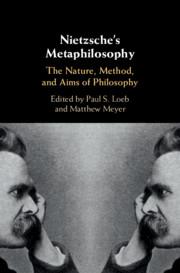Book contents
- Nietzsche’s Metaphilosophy
- Nietzsche’s Metaphilosophy
- Copyright page
- Contents
- Contributors
- Acknowledgments
- Note on Texts, Translations, and References
- Abbreviations
- Introduction
- Part I Evolving Metaphilosophies
- Part II The Nature of Philosophy
- Part III The Method of Philosophy
- Part IV The Aims of Philosophy
- Chapter 10 Nietzsche’s Aesthetic Conception of Philosophy
- Chapter 11 Metaphilosophy and Metapolitics in Nietzsche and Heidegger
- Chapter 12 Nietzsche’s Psychology of Metaphysics (or Metaphysics as Revenge)
- Chapter 13 “The Great Seriousness Begins”
- Bibliography
- Index
Chapter 10 - Nietzsche’s Aesthetic Conception of Philosophy
A (Post-Kantian) Interpretation of The Gay Science §373
from Part IV - The Aims of Philosophy
Published online by Cambridge University Press: 24 October 2019
- Nietzsche’s Metaphilosophy
- Nietzsche’s Metaphilosophy
- Copyright page
- Contents
- Contributors
- Acknowledgments
- Note on Texts, Translations, and References
- Abbreviations
- Introduction
- Part I Evolving Metaphilosophies
- Part II The Nature of Philosophy
- Part III The Method of Philosophy
- Part IV The Aims of Philosophy
- Chapter 10 Nietzsche’s Aesthetic Conception of Philosophy
- Chapter 11 Metaphilosophy and Metapolitics in Nietzsche and Heidegger
- Chapter 12 Nietzsche’s Psychology of Metaphysics (or Metaphysics as Revenge)
- Chapter 13 “The Great Seriousness Begins”
- Bibliography
- Index
Summary
The article considers Nietzsche’s conception of philosophy by giving a careful interpretation of aphorism 373 of book V of The Gay Science. In this important aphorism, Nietzsche puts forward the idea that all genuine philosophical judgments are akin to a judgment about “the value of a piece of music,” and hence akin to judgments that express “what good taste demands” (GS 373). The article takes this to mean that, for Nietzsche, philosophical judgments are value-judgments, and value-judgments are aesthetic judgments (or judgments of taste). On this basis, the article then tries to take two further steps: first, to show that Nietzsche understands aesthetic judgments by the lights of Kant’s conception of taste as a “reflective taste” (CJ 8), thereby conceiving of aesthetic value-judgments as reflective judgments; second, the article argues that Nietzsche’s view of philosophical judgments as reflective value-judgments is the basis of his rejection of a positivist (or, in modern vocabulary, naturalist) conception of philosophy. Finally, the article links Nietzsche’s conception of philosophy to his conception of life as akin to music, and thus as having a polysemic, perspectival, and interrogative nature (or the “character of a question-mark”, GS 375).
Keywords
- Type
- Chapter
- Information
- Nietzsche's MetaphilosophyThe Nature, Method, and Aims of Philosophy, pp. 187 - 206Publisher: Cambridge University PressPrint publication year: 2019
- 1
- Cited by

